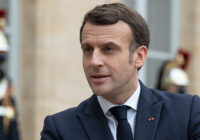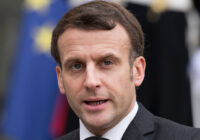In a recent interview with The Economist, French President Emmanuel Macron shocked fellow NATO allies by calling the organization “brain dead.” His words, described as “astonishingly candid,” received a harsh rebuke from Germany’s Chancellor Angela Merkel as well as from Turkey’s President Recep Tayyip Erdogan. While NATO celebrates its 70th anniversary this year and has gathered all the heads of member states for a summit in London this week, this French attitude is more than just “grandeur” or Gaullism. Macron only articulated what think tanks and diplomats have been saying since at least 2016: The North Atlantic Treaty Organization needs to wake up.
Is Europe Really Ready for Its Own Military Force?
Defining Macron’s foreign policy style has to do with to what degree the French president recognizes himself in certain Gaullist impulses or movements. This is something that has been pointed out recently, after several occasions where Macron criticized the United Kingdom over Brexit, Italy over its populist government or, more recently, the United States for unilaterally imposing new digital tariffs that would harm major US companies such as Amazon. Some commentators have seen this as a move to take the lead in Europe, at a moment when other European leaders are being weakened.
One Against All
Macron’s comments to The Economist reveal the discrepancy between his deepest aspirations — the need for ensuring peace and stability in Europe — and what he described as the return of the Great Powers competition, where the European Union seems unable and unwilling to act. The context in which the interview was recorded, just days after Turkey’s invasion of northern Syria, underlines the frustration of having to deal with some difficult allies.
Interestingly, the French leader took this opportunity to use forceful rhetoric by going back to what could be seen as a traditional French defiance vis-à-vis the alliance. Even after the full return of France within the integrated military command structures of NATO — which took place in 2009 under President Nicolas Sarkozy — there were some debates on its necessity. Hubert Vedrine, an iconic minister of foreign affairs under President François Mitterrand, concluded that France had no other credible alternatives.
Yet since his election in 2017, Macron has decided to go it alone. In a speech at La Sorbonne in September 2017, the president of the French Republic unveiled his idea of an initiative that would facilitate the emergence of a European strategic culture and create the preconditions to conduct coordinated and jointly prepared future commitments. This European Intervention Initiative (EI2) is aimed at reinforcing the ability Europeans have to act together and to carry out all possible military operations on a whole spectrum of issues that could affect Europe’s security.
However, it took almost a year to start implementing this cooperation. The first nine ministers of defense signed the letter of intent in June 2018. And, despite all the potential benefits of such an initiative, there were some concerns about possible duplication with NATO or/and EU. Macron believed — and still does — that Europeans have to start moving from words to actions and to explain their commitment to European security by engaging in operations. This happened at a moment when US commitment in Europe was wary, with US President Donald Trump refusing to back Article 5, which caused some tension among those member states who have been under Soviet rule. Macron did not consider the particular situation of those countries for which US commitment to their defense has been essential.
By revealing, very loudly, that there were concerns, Macron has echoed Hans Christian Andersen’s tale by saying that, yes, the king was naked. By doing so just weeks before the celebrations of NATO’s 70th anniversary in London, Macron has spoiled the expectations of the summit, which was supposed to celebrate unity and renewed cohesion.
Where Next?
Of course, no other European leaders agreed with the assessment. Angela Merkel was the first to condemn the Macron’s comments. As weeks passed by, the invectives went on, culminating with Erdogan asking if Macron was not brain dead himself, and even with Trump calling the French analysis “insulting.”
So, what purpose did these comments serve? First of all, France has taken credit for asking NATO to do more in the fight against terrorism, and by shifting the focus to the south and the complex security operations France leads in the Sahel — two directions aligned with France’s strategic goals. Second, it has forced NATO to accept the principle of a group of experts “to further strengthen NATO’s political dimension including consultation.” Third, it has created enough turmoil to wake up NATO, but also to force Europeans to think more for themselves.
Somehow, Macron has taken a bet that, in the long run, might benefit NATO, the EU and himself. In forcing the US to reinvest in the alliance, by making the Europeans aware that the US security guarantee might be coming to an end, and by again being at the center of attention — even if this center is of criticism — Macron might have played a better hand than he imagined.
The views expressed in this article are the author’s own and do not necessarily reflect Fair Observer’s editorial policy.
Support Fair Observer
We rely on your support for our independence, diversity and quality.
For more than 10 years, Fair Observer has been free, fair and independent. No billionaire owns us, no advertisers control us. We are a reader-supported nonprofit. Unlike many other publications, we keep our content free for readers regardless of where they live or whether they can afford to pay. We have no paywalls and no ads.
In the post-truth era of fake news, echo chambers and filter bubbles, we publish a plurality of perspectives from around the world. Anyone can publish with us, but everyone goes through a rigorous editorial process. So, you get fact-checked, well-reasoned content instead of noise.
We publish 2,500+ voices from 90+ countries. We also conduct education and training programs
on subjects ranging from digital media and journalism to writing and critical thinking. This
doesn’t come cheap. Servers, editors, trainers and web developers cost
money.
Please consider supporting us on a regular basis as a recurring donor or a
sustaining member.
Will you support FO’s journalism?
We rely on your support for our independence, diversity and quality.






